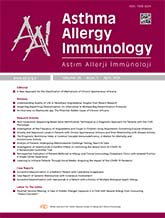


Objective: Although ACE inhibitor-induced angioedema is a well-documented adverse effect in adults, there is a paucity of data on its development and prevalence in children, except case reports. This study aimed to investigate the frequency and clinical course of angioedema and cough in pediatric patients taking ACE inhibitors for hypertension, chronic renal failure, and proteinuria.
Materials and Methods: The study population comprised pediatric patients using ACE inhibitors due to hypertension, chronic kidney disease, and proteinuria, who were treated at the Ankara Bilkent City Hospital Pediatric Nephrology Clinic between 1 January 2022 and 1 April 2022.
Results: The study included 357 patients with hypertension, of whom 157 were pediatric patients on ACE inhibitors. Two patients (1.7%) developed acute angioedema with tongue, lip, and facial involvement after chronic use of ACE inhibitors. No cough was observed in any of the patients on ACE inhibitors.
Conclusion: Angioedema as a result of antihypertensive drugs in pediatric populations is a rare but potentially life-threatening condition. In the event of angioedema developing in patients undergoing treatment with ACE inhibitors, it is of the utmost importance to be mindful of this and to cease the administration of the drug in question immediately.